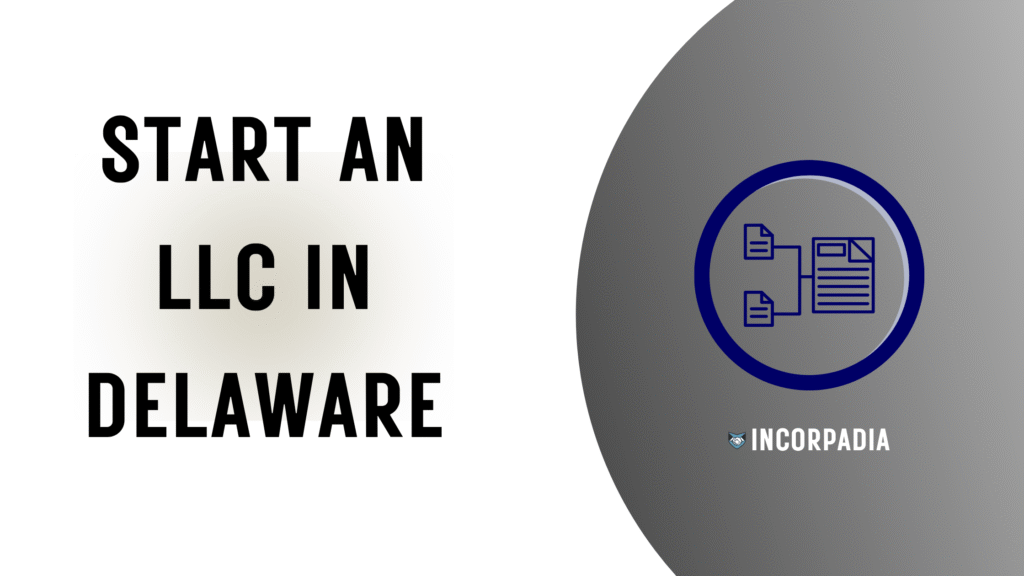Starting a business is an exciting journey, and one of the first steps you’ll take is choosing the right business structure.
If you’ve decided to form a Limited Liability Company (LLC), Delaware is one of the best places to do so. Known for its business-friendly environment, Delaware offers streamlined procedures, favorable tax laws, and strong legal protections for entrepreneurs. In fact, Delaware is the preferred state for many businesses, including some of the world’s biggest corporations, because of its advantageous legal framework and ease of doing business.
In 2025, Delaware remains a top choice for small business owners looking to protect their personal assets, limit their liability, and enjoy tax benefits. Forming an LLC in Delaware provides flexibility in management, ownership, and taxation, all while maintaining a simple filing process.
The state is known for quick processing times, an efficient online filing system, and an annual franchise tax that is relatively low compared to other states. What’s more, Delaware doesn’t require an LLC to have an Operating Agreement or annual meetings, making it easier for owners to run their businesses without the complexity of formal governance structures.
However, just because Delaware is known for its business-friendly atmosphere doesn’t mean the process of starting an LLC is automatic. There are steps that need to be followed carefully to ensure your business is legally formed and compliant with state laws. From choosing your LLC name to filing the necessary paperwork, obtaining an Employer Identification Number (EIN), and meeting ongoing filing requirements, understanding the process is crucial.
This guide will walk you through each step of starting an LLC in Delaware in 2025, offering practical advice and tips to make the process as smooth as possible. Let’s get started!
Here Are the Steps to Forming an LLC in Delaware
Starting an LLC in Delaware involves several key steps. Each step ensures your business is legally set up, and it complies with both state and federal requirements. Let’s go through the process in detail.
1. Search Your LLC Name
Before you begin any official filings, the first thing you need to do is choose a name for your LLC. The name you select must be unique and meet certain legal requirements set by the Delaware Division of Corporations.
Requirements for an LLC Name in Delaware:
- Uniqueness: Your LLC name must not be the same or too similar to any existing businesses registered in Delaware. The state allows you to check name availability before proceeding.
- Must Include “LLC”: Your business name must contain the words “Limited Liability Company,” “LLC,” or “L.L.C.” to clearly identify it as an LLC.
- Avoid Restricted Words: Certain words are restricted or require additional documentation. For example, terms like “bank,” “insurance,” or “university” typically require extra approval to use.
To check if your desired LLC name is available, you can search the Delaware Division of Corporations’ online database. If the name is available, you can move on to the next step.
2. Choose a Delaware Registered Agent
All Delaware LLCs are required to have a Registered Agent, which is a person or business that acts as your LLC’s official point of contact for legal matters. The Registered Agent will receive any legal documents, such as lawsuits or government notices, on behalf of your LLC.
Who Can Be a Delaware LLC Registered Agent?
- Individual: You can serve as your own Registered Agent, but you must have a physical address in Delaware, not just a P.O. Box.
- Professional Registered Agent Service: Many business owners prefer to hire a professional Registered Agent service. These services have a physical office in Delaware and can ensure that all legal documents are properly received and forwarded to you in a timely manner.
It’s important to note that the Registered Agent must have a physical address in Delaware (P.O. Boxes are not allowed) and be available during normal business hours to accept any legal notices.
3. File Delaware Certificate of Formation
Once you’ve selected a name and chosen a Registered Agent, you must file the Certificate of Formation with the Delaware Division of Corporations. This document officially establishes your LLC in the state of Delaware. The filing can be done online, by mail, or in person.
Key Information in the Certificate of Formation:
- LLC Name: The official name of your LLC.
- Registered Agent: The name and address of your Delaware Registered Agent.
- Duration of LLC: You must state if your LLC is intended to last indefinitely or for a specific period.
- Effective Date: The date when you want your LLC to officially begin its operations (if different from the filing date).
Filing Fees:
- The standard filing fee for the Certificate of Formation is $90. This fee must be paid when you submit your filing, and it’s non-refundable.
Once the Certificate of Formation is filed, it typically takes about 10 business days to process. If you need your LLC formed quickly, you can pay for expedited services for an additional fee.
4. Create an LLC Operating Agreement
Though Delaware law does not require LLCs to have an Operating Agreement, it’s highly recommended to have one in place. An Operating Agreement is a document that outlines the ownership, management structure, and operating procedures for your LLC.
Why Should You Have an Operating Agreement?
- Defines Roles and Responsibilities: It specifies the roles of members (owners) and managers, outlining their powers, duties, and obligations.
- Outlines Profit Distribution: It defines how profits and losses will be shared among members of the LLC.
- Prevents Disputes: With clear terms in place, an Operating Agreement can help prevent conflicts between members.
The Operating Agreement is an internal document, meaning it doesn’t need to be filed with the state. However, it is a crucial document to have for the smooth operation of your LLC.
5. Obtain an EIN (Employer Identification Number)
An EIN, also known as a Federal Tax ID Number, is required for most LLCs. It’s used by the IRS to identify your business for tax purposes, and you’ll need it to open a business bank account, hire employees, and file taxes.
How to Obtain an EIN:
You can apply for an EIN directly from the IRS, and it’s completely free. You can apply online via the IRS website and receive your EIN immediately.
If you don’t have employees, you may still need an EIN if:
- You have a multi-member LLC.
- You plan to open a business bank account.
- You plan to elect your LLC to be taxed as an S-Corp or C-Corp.
6. Delaware Business Licenses and Permits
In addition to filing the Certificate of Formation and obtaining an EIN, you may need specific licenses or permits to operate your business legally in Delaware. Depending on your business activities, you might need federal, state, or local licenses.
Types of Licenses and Permits:
- State Business License: Almost all businesses in Delaware need to apply for a state business license. The Delaware Division of Revenue is responsible for issuing this license.
- Local Permits: Depending on your business location, you may need additional permits from the county or city in which you operate.
- Industry-Specific Licenses: Certain industries, such as healthcare, food services, or construction, may require specialized licenses or certifications.
Delaware provides a useful online system to help you register and apply for the necessary business licenses.
What to Do After Your LLC is Approved
Once your LLC has been formed, there are still a few important steps to take in order to maintain compliance and ensure the long-term success of your business.
How Much Does a Delaware Annual Franchise Tax Report Cost?
Delaware LLCs are required to file an Annual Franchise Tax Report each year. The annual tax for an LLC is $300, which is due by June 1st of every year. This is a flat fee and does not change based on the size or income of your LLC.
When Is the Annual Franchise Tax Report Due?
The Annual Franchise Tax Report is due every year on June 1st. If your LLC was formed during the year, the first report is still due the following June.
When is My First Annual Franchise Tax Report Due?
Your first Annual Franchise Tax Report is due by June 1st of the first year following the year in which your LLC was formed. For example, if you formed your LLC in 2025, your first report would be due by June 1st, 2026.
How Do I File My LLC Annual Franchise Tax Report?
The filing for the Annual Franchise Tax Report can be done online through the Delaware Division of Corporations’ official website. It’s a straightforward process, and you’ll need to provide some basic information about your LLC, including the address and Registered Agent details.
How Will My LLC Be Taxed?
By default, a Delaware LLC is treated as a pass-through entity for tax purposes. This means that the LLC itself is not taxed at the federal level. Instead, profits and losses are passed on to the individual members (owners) of the LLC. Members will report their share of the LLC’s income on their personal tax returns.
However, you have the option to elect your LLC to be taxed as a C-Corporation or S-Corporation by filing Form 8832 with the IRS.
Final Thoughts
Starting an LLC in Delaware in 2025 can be a highly advantageous decision for business owners looking to protect their personal assets, enjoy favorable tax treatment, and benefit from a streamlined formation process. With its business-friendly laws, quick processing times, and a reputation for being a top destination for both small startups and large corporations, Delaware remains one of the best states to form your LLC.
While the process of establishing an LLC in Delaware is relatively simple, it’s crucial to follow each step carefully—from choosing a unique LLC name and designating a registered agent to filing your Certificate of Formation and obtaining the necessary licenses. Ensuring that you maintain compliance through annual filings and paying your franchise taxes will help keep your LLC in good standing and avoid unnecessary penalties.
Additionally, while Delaware doesn’t require an Operating Agreement, it’s still highly recommended to create one. This internal document outlines your LLC’s structure, roles, and responsibilities, helping avoid disputes down the road.
For non-U.S. residents and businesses considering Delaware for their LLC, the state remains an open and accessible option, with clear steps to follow. By understanding the process and making sure you complete each necessary step, you’ll set your business up for long-term success in Delaware. Whether you’re just starting or expanding, Delaware offers a robust legal environment to grow your business with confidence.
FAQs
Can I Start an LLC Online in Delaware?
Yes, Delaware allows you to file all the necessary paperwork to form an LLC online through the Delaware Division of Corporations website.
Is Delaware a Good State to Start an LLC?
Delaware is an excellent choice for forming an LLC due to its favorable laws, low fees, and efficient processing. Additionally, the state’s laws offer strong liability protection for LLC owners, which makes it a popular choice among businesses of all sizes.
Can a Non-U.S. Resident Form an LLC in Delaware?
Yes, non-U.S. residents can form an LLC in Delaware. However, they must appoint a registered agent with a Delaware address and may need to provide additional documentation to meet state requirements.
Do I Need a Business Address in Delaware?
Yes, Delaware requires all LLCs to have a physical address (not a P.O. Box). Many businesses choose to use their registered agent’s address as their official business address.







